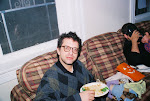"The first response of the military, according to the television journalist Tim Russert, was shock and anger, not at the fact of a terrorist attack on U.S. soil, which was, Russert said, "expected" — he used this very word but at the precision and perfect execution of the attack. "They chose planes leaving for Los Angeles. The bastards knew they would have full tanks of fuel for maximum impact," Russert quoted a military man as saying.
"Most people in lower Manhattan said that seeing th efall of the towers was like watching a movie or being woken up from a "dream." (Why have we seen so many movies with these images in them? Were we in a dream?) NBC created a logo shown in the lower fight hand corner, as did CNN, and then many other television stations followed suit [sic], all of which say "Attack on America." It looks like any other logo. THis morning the narrative has progressed and the logos say, "The Day After," perhaps a reference to a famous television film shown in 1982 at the height of the Cold War . . .
"The attack punched right through the surface of complacency and familiarity with everyday life, and to some extent the networks have been trying to calm their viewers, recalling familiar narratives in which enemies are irrational, our spirit indominable [sic], our response unified and professional.
"Initially it appeared that the whole story was being managed or suppressed. The mayor of New York [Giuliani] was about to estimate the numebr of people killed and he was cut off. The military has cordoned the press from the Pentagon in such a way so that no decent visuals of the damage have been shown on television. For a long time there was no ground-level footage of the Wall Street area. I heard from observers through word of mouth that people had been falling or jumping out of windows from the burning towers. The first respons of the government was to hide the president. Key members of the administration were also spirited away. A spokeswoman, Karen Hughes, a political appointee close to the president and someone of no official authority, was the first government representative really to brief the press. She stressed that "banks have been open today" (Tuesday), a sign also to the perpetrators that they did not shut down our financial engines. . . .
"I thin the perpetrators of these acts should be punished. But I also know that the spectacle of mass displacement and destruction is familiar to people in impoverished or war-torn places in the world, like Congo and Sierra Leone and Namibia, that supply many of the substances [coltan, bauxite, diamonds, uranium] that supply the technology that drives the marketplace here. In the U.S. we are at the center of a regime that relies on people in faraway places to sell their labor and their products into a global market that effectively bars many of them from ever attaining the kinds of comforts taken for granted by us here. The detruction of the World Trade Center . . . has driven home the fragility of the boundaries between our world, our dream, and the places where all those other people live.
"I think the attack will ultimately force the U.S. to think more clearly . . . the rhetorical response by the government was that of a nation-state in peril. Today Secretary Powell is asking the international community, and particularly NATO, for ints unqualified support, on the grounds that our territory has been directly attacked. Our military will however very likely be acting unilaterally, and in the this sense we are now a nation at war.
"On the other hand, it seems to me that the attack was not made entirely, or even mainly, on the capacity of the U.S. as a nation-state, but on the U.S. as the controlling center of the world economy, and the enforcer of policies abroad, especially in the middle east, that are linked to that economy. We thought we could administer this structure — an empire, an economy, a sphere of interest — with no security at its core. We assumed we operate as we did partly because we wtill hold ideals enshrined by Jefferson and Adams and Paine, and partly because we have grown complacent and ignorant. We have a presence in the world that goes well beyond any other nation's, and a standard of living that relies on this presence. Maybe scholars and even politicians think about these things, but most Americans do not. I suspect Thomas Jefferson himself would call us an imperial power if he were alive today. I think Americans will now have to consider these kinds of contradictions with greater self-consciousness in the wake of this attack.
"The ruins of seven collapsed buildings in New York are still burning at this time."

No comments:
Post a Comment